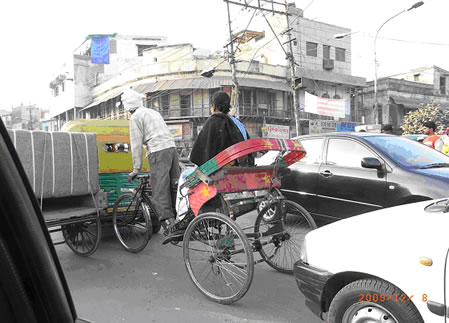|
A summary report on an international
symposium on Central Asia held at Jawaharlal Nehru State University in
New Delhi*
Dec.28,
2009, by Akio Kawato (General Manager Japan and World Trends)
http://www.japan-world-trends.com
I attended the international symposium “Regional cooperation and
security in Central Asia” organized by Prof. K. Warikoo, Director of
the Central Asian Studies Programme at Jawaharlal Nehru University. It
was held on December 4-5 and was attended by about twenty foreign
participants from Central Asia, Russia, the EU and other parts of the
world.
General impression of New Delhi
It was my first trip to New Delhi in five years. The number of cows and
man-drawn tricycle taxis has decreased, and new large shopping malls
have been built. However, there are no visible signs of a construction
boom, which one can find in China. It is probably because lands are
owned privately in India, thus making rapid large-scale razing and
reconstruction next to impossible. Therefore, my general impression is
that the tempo of India’s economic development is slower than that of
China, though their development probably has a more steady character.
In punctuality and organizational skills things leave much to be
desired, but in places where there are good managers, workers looked
highly motivated and are able to quickly act on their own judgment.
 |
Main features of the symposium
No particular conclusions and proposals were made at the symposium. It
peacefully proceeded with presentations followed by discussions. I
would draw out the following main points (My impressions, which I
acquired in my meetings with Indian experts outside the symposium, are
combined in the below points).
- (1) All participants were aware of the growing
influence of China in Central Asia, in the Shanghai Cooperation
Organization (SCO) inter alia. Some countries are accordingly
readjusting their policy toward Central Asia and the SCO. Especially
for Europe the SCO, if it is coupled with the EU, may seem to be a
suitable forum where they could involve China in a multilateral
discussion.
- Russian President Dmitry Medvedev has proposed
a new mechanism for security by combining NATO, the CSTO, the SCO and
the OSCE under one umbrella. This, if ever realized, would form
something between the OSCE and the UN for the entire Eurasia except for
the Middle East. If NATO, the EU and the SCO ever develop mutual ties
(it will not happen so quickly though), Japan should be aware of the
risk of being left out from this new deal. Perhaps, the remedy would be
accession of the Central Asian countries to APEC and closer cooperation
among Japan, the EU and NATO.
- (2) On one hand, India still does not express a
grave concern about encroaching Chinese influence around it. Probably
India is well aware that the Chinese leadership today does not pursue
an expansionist policy, attaching priority to the maintenance of
stability. Further, the maritime predominance of India in the Indian
Ocean, an important route for Chinese tankers going to and coming from
the Middle East and Africa, gives them confidence.
On the other hand, India does not feel that the tripartite forum
composed of India, China and Russia provide a solid basis for their
policy in Eurasia, because of the mutual apprehension between India and
China.
- (3) India feels comfortable with the current
status of their relations with the U.S. India believes that it has
capacity to influence U.S. policy, partly because there are about two
million Indian people living in the U.S. However, India is well aware
of the fact that as long as the Afghan War continues Pakistan will
remain more important for the U.S., because it is the Pakistani
intelligence forces which gather and possess information about the
Taliban.
- (4) Japan under the Abe administration
(2006~07) promoted its relations with India, intending to balance the
growing power of China. Mr. Abe even declared a “Strategic Global
Partnership” with India. However, I did not find much enthusiasm among
Indian experts about prospects of cooperation with Japan. India seems
to believe that Japan does not possess enough capacity to affect the
balance of power around India.
Brief Comments about my own statements
During the symposium I stressed the importance of helping the Central
Asian countries consolidate their statehood. In this undertaking, I
suggested that Japan, India and member states of the EU could form a
loose grouping, because their weight in Central Asia is likewise middle
level, and because their objectives in this part of the world are
largely identical (and innocuous). I call it a “Star Alliance”** in international relations.
* This project is partly
supported by
the Grants-in-Aid for Scientific Research by the Japan Society for the
Promotion of Science: "An Emerging New Eurasian Order: Russia, China
and Their Interactions toward Neighbors."
** The Star Alliance is
originally a
union among second-tier airlines. Today's growing list of Star Alliance
members includes, among others, All Nippon Airways (Japan), Lufthansa
(Germany), Scandinavian Airline System (composed of Denmark, Norway,
and Sweden), United Airlines (U.S.), Continental Airlines (U.S.), and
Asiana Airlines (South Korea).
*The views expressed in the essay belong
solely
to the author and do not represent the official position of any
organizations to which the author is permanently or was temporarily
affiliated.
[index]
|

